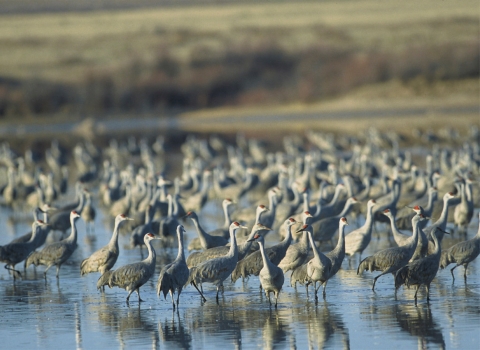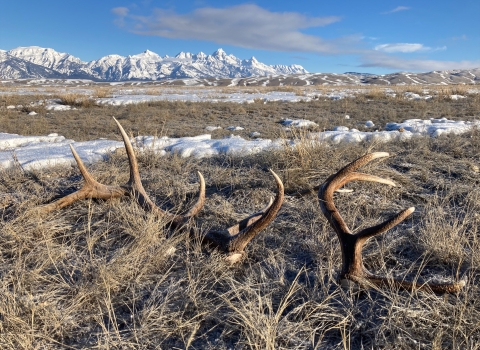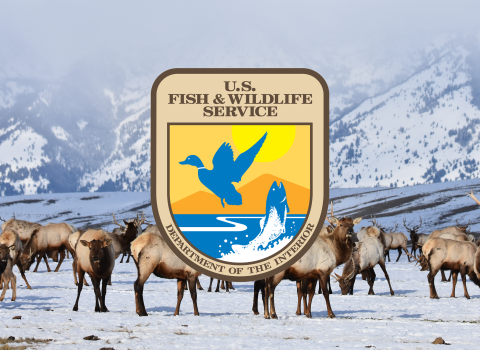The U.S. Fish and Wildlife Service (Service) is proposing changes to the management regulations for Mexican wolves (Canis lupus baileyi) in the Mexican Wolf Experimental Population Area (MWEPA) in Arizona and New Mexico under section 10(j) of the Endangered Species Act (ESA).
“We believe these changes to the Mexican wolf 10(j) rule will allow us to recover Mexican wolves more effectively in the wild,” said Amy Lueders, the Southwest Regional Director for the Service. “The revision process presented an opportunity to work closely with our partners in aligning our regulatory framework with the science-based management recommendations in the 2017 revised recovery plan.”
The Mexican wolf, once common across the southwest, was all but eliminated in the wild by the 1970s. The species was placed on the endangered species list in 1976, a year later the Service began developing a binational captive breeding and release program with Mexico that has increased Mexican wolf numbers to approximately 350 in the wild. These recovery efforts included the designation of the MWEPA in 1998 to reintroduce Mexican wolves in Arizona and New Mexico as a nonessential experimental population under section 10(j) of the ESA.
The Service is proposing revisions to modify the population objective, establish a genetic objective and temporarily restrict three allowable forms of take of Mexican wolves in the MWEPA that were established in the 2015 10(j) rule. The proposed changes to the rule will bring the management of the wild population in line with recovery criteria for the species as identified in the 2017 revised Mexican wolf recovery plan.
The proposed change to the population objective removes the population limit from the 2015 10(j) rules, which currently allow a maximum of 300-325 Mexican wolves. Removing this limit aligns the population goal with the recovery criteria in the 2017 recovery plan. The Service is also proposing the establishment of a genetic diversity objective within the MWEPA, with a goal of 22 released wolves surviving to breeding age by 2030, and the temporary restriction of three forms of allowable take until the genetic diversity goals are met.
In 2018, the U.S. District Court of Arizona remanded the 2015 final MWEPA 10(j) rule to the Service to revise the designation of the MWEPA in Arizona and New Mexico. The ruling directed the Service to redress several components of the rule to ensure the experimental population contributes to long-term Mexican wolf conservation and recovery.
Following the court order, the Service also reconsidered the nonessential experimental designation for the U.S. population of Mexican wolves. The Service has determined a change to the nonessential experimental population designation is not warranted. In addition, the proposal does not include any changes to the MWEPA geographic boundaries.
Accompanying the rule is a draft supplemental Environmental Impact Statement (DSEIS) that analyzes how the proposed revisions will impact biological resources, land use, environmental justice, human health and public safety, and economic activities such as ranching and big game hunting. Information from a public scoping period conducted from April 15, 2020, to June 15, 2020, was incorporated into the DSEIS and the proposed rule.
In keeping with the Service’s mission to work with others to conserve, protect, and enhance fish, wildlife, plants, and their habitats for the continuing benefit of the American people, the Service collaborated closely with the states of Arizona and New Mexico, as well as our federal, local and Tribal partners, throughout this process.
The Service will hold a series of virtual public hearings and information sessions regarding the proposed changes and DSEIS during the 90-day public comment period. Information on dates and how to register can be found at https://www.fws.gov/southwest/es/mexicanwolf/10j-revision.
The proposed rule and DSEIS will publish on Friday October 29, 2021 and will be available for review at http://www.regulations.gov in Docket No. FWS-R2-ES-2021-0103. Public comments will be accepted 90 days from the date of publication in the Federal Register and may be submitted through http://www.regulations.gov by searching the docket number.



